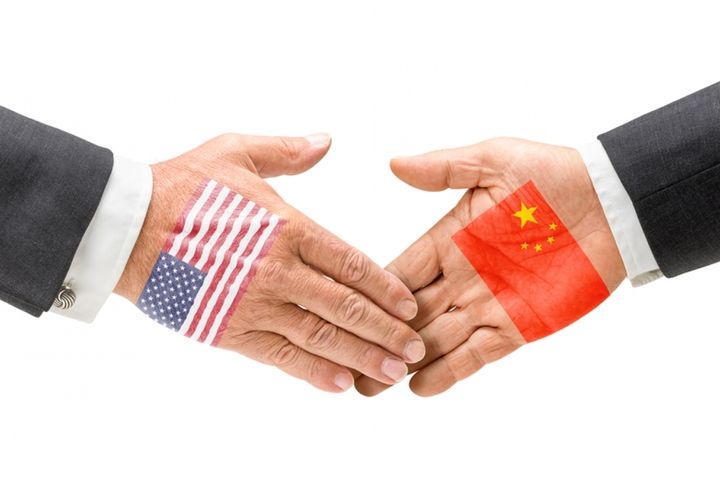 Major China-US Trade Deals Deal Blow to Protectionism Movement
Major China-US Trade Deals Deal Blow to Protectionism Movement(Yicai Global) Nov. 21 -- US President Donald Trump closed trade deals worth more than USD250 billion between US and Chinese companies during his recent visit to China. The new partnerships cover a wide variety of businesses ranging from energy to technology. Increasingly strong economic and trade ties between the world's two largest economies dealt a bitter blow to the protectionist movement in the US.
Trade Deals Led by State-owned Enterprises (SOEs)
Investment agreements for four deals have been publicly disclosed, all of which involve Chinese SOEs as main investors. This is somewhat surprising, considering the fact that many SOE investments have been blocked by the US government during the past 10 years. Protectionism has reached an unprecedented level since the Trump administration took office, and Chinese investors have experienced a very rough time in the US market over the past several months, in particular.
The Office of the US Trade Representative formally introduced the Section 301 review on Aug. 18, accusing China of using investment deals in the US as a tool to transfer technology. On Sept. 13, President Trump blocked the USD1.3 billion acquisition of American semiconductor manufacturer Lattice Semiconductor Corp. [NASDAQ:LSCC] by Canyon Bridge Capital, a fund backed by Chinese businesses.
Two senators from Texas and California, John Corny and Dianne Feinstein introduced the Foreign Investment Risk Review Modernization Act after eight months of preparation on Nov. 8, calling for a reform of the Committee on Foreign Investment in the US (CFIUS) and expansion of its authority. More stringent measures should be imposed on takeovers of American tech firms by Chinese businesses, they stressed.
CFIUS is an inter-agency committee of the United States Government that reviews the national security implications of foreign investments in US companies or operations. At least 10 acquisition deals involving Chinese investment are currently pending review by the committee, and some of them, including Ant Financial Services Group's proposed acquisition of Moneygram International Inc. [NASDAQ:MGI], have submitted application materials more than once. Ant Financial Services Group is the financial services arm of Chinese internet giant Alibaba Group Holding Ltd. [NYSE:BABA].
Chinese investment is mostly concentrated in the energy sector, according to the agreements of the four disclosed deals, meaning that technology investment has become the target of the protectionist bias of the US government and Congress.
Technology Acquisition Is a Normal Investment
Acquiring advanced technology is just a natural part of business development for all companies. Having improved their learning capabilities, a growing number of companies from emerging economies have expanded into overseas markets, aiming to foster (technology) advantages that they can exploit to drive business growth.
Japan, South Korea and Taiwan followed a very similar path several decades ago. Even the US developed its national industrial infrastructure back in the 1900s relying mostly on technology that they acquired in Europe. In fact, all successful industrial revolutions in the world, including the one in Britain, are the product of 'advantage acquisition'.
The same can be said about cross-border mergers and acquisitions between companies in developed nations, where many acquirers' biggest ambition is to obtain technology from the target companies in the host countries, and incorporate it into their own technology systems. This allows them to create new technical competitiveness by integrating technology resources in the industry or knowledge domain. CISCO, for example, bought many small- and medium-sized competitive tech firms, and used them together to foster competitiveness. The company grew rapidly through successful mergers and acquisitions, and has established itself as a dominant player in several information technology markets today.
Protectionism Is Harmful to Both Sides
Tony Fratto, assistant Treasury secretary to former US President George W. Bush, published a book titled 'Lessons From Lenovo: The Case For Welcoming Foreign Investment' on Oct. 24 against the protectionist objections.
Chinese computer company Lenovo Group [HKG:0992] planned to acquire IBM's personal computer business in 2005. Back then many people were skeptical about an acquisition of a US multinational by a Chinese firm. Congressman Don Manzullo demanded a national security review of the deal, warning that if the deal is approved, it may result in a distorted market that could compromise state security.
Had Rep. Manzullo gotten his way, the Lenovo transaction would have been blocked -- at a real cost to American workers and businesses, Fratto wrote in his book.
"Foreign investment is enormously beneficial to the US economy, but it's very easy for some domestic interests to cloak protectionism in the guise of national security," said Fratto. "If that's the outcome, it would be a big mistake. It would weaken our own economy and open a huge hole for other countries to run through," he noted in a recent interview with New York Times.
Protectionism in investment will bring harms to both sides. The growing protectionist bias in the US has already confounded and frustrated Chinese investors, the value of M&As announced and proposed by Chinese companies in the US during the first nine months of this year was down 67 percent, compared with the 23 percent decline worldwide, data from US research agency Rhodium Group LLC. suggested. Furthermore, the value of new deals in West Europe has already rebounded to the same level seen last year.
Apart from one-off lump sum deals, President Trump should put the lid on growing protectionist tendencies before they block more foreign investments beneficial to the US economy. Like investors from other countries, Chinese companies have brought -- and will continue to bring -- more new jobs, tax revenues, greater variety and competitively priced products to host countries -- tangible benefits that Trump needs to deliver to his people as the president.
(The author is the deputy director of the National Economy Research Institute)